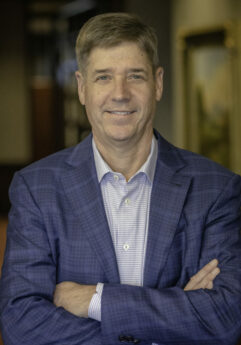HOME | ABOUT US | MEDIA KIT | CONTACT US | INQUIRE
HOME | ABOUT US | MEDIA KIT | CONTACT US | INQUIRE
In the aftermath of First Republic Bank’s collapse, we spoke with Paul Holewinski CEO of Academy Bank and Armed Forces Bank to gauge the financial Kansas City market.
“If I were to speculate, the Fed is going to likely overshoot and keep rates higher, longer than they need to, because they're going to wait until they see clear trailing evidence that inflation is under control.”
Q: Do you have any concerns about Washington stepping in to make depositors whole even if their risk is above $250,000?
A: The FDIC (Federal Deposit Insurance Corporation) came out and recommended increasing deposit caps. However, it certainly seems prudent given what the industry has experienced over the last few months. I think it would go a long way in providing depositors peace of mind. And with the recent failures, the FDIC, and the government has provided this implicit guarantee. And so if it’s already implicit why wouldn’t go ahead and just make it clear to everyone if you put it into law?

Q: Have you seen any changes at Academy and Armed Forces in terms of loan demand and approval?
A: For the last couple of months, we’ve seen a downturn in demand especially in commercial real estate. I think the reasons are fast-rising rates and a really unprecedented number of rate hikes. Up to 525 basis points if I’m doing the math. Then throw in an uncertain economic environment, and the commercial real estate deals just aren’t penciling as they did a year ago. So, it takes more equity to get projects done. Maybe not as many willing buyers and sellers. I think that certainly has contributed to the downturn.
Q: Does the highly competitive Kansas City market, relative to peer cities, tend to have banks running leaner, sounder operations here?
A: Well given our more conservative Midwestern roots here, that’s probably true. We’ve been insulated from peaks and valleys, things just don’t go up as much, they don’t go down as much as they do on the coasts. So that has been an impact on how we approach our business. We don’t ramp up or down really too quickly, both in good times and bad. It keeps us more of an even keel. I think we tend to focus on operations and efficiencies, generally more than other organizations outside of Kansas City. At our banks, we’re looking at RPA and other automation in our sales ops and risk management, trying to get the most out of the business and look for efficiency anywhere we can.
Q: Any sense of how high the Fed will have to go with interest rates to meet its inflation-control goals?
A: The Fed has been unfazed by that. I do think they believe those incidents were isolated given their business models. Whether how high the Fed goes in its inflation control goals, that’s the million-dollar question. If I were to speculate, the Fed will likely overshoot and keep rates higher, longer than they need to, because they’re going to wait until they see clear trailing evidence that inflation is under control.
Now, that’s just my personal opinion but I think that’s reasonable to think given they have a tough job snuffing out the inflationary environment. And that will cause a recessionary environment. From our standpoint and others, I think we’ve looked at the tea leaves and how bad will it become. The hope is that it won’t, but I think you have to plan for a lot of different contingencies.